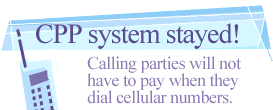

|
|
|
|
| HOME | INFOTECH | HEADLINES | |||
|
October 28, 1999
HEADLINES
|

The Telecom Regulatory Authority of India suffered another blow today when the Delhi high court stayed implementation of the 'calling party pays' system from November 1.
''Also, without the change, some cellular operators are willing to offer free incoming calls in the existing system. It is a matter which requires detailed examination.'' The court has granted ad interim stay of the notification, barely three days before the CPP system comes into effect, and fixed November 16 for the next hearing. The division bench was hearing two petitions together - one civil writ filed by the MTNL and the other a public interest litigation filed by telecom watchdog, a Delhi based organisation. The MTNL argued that introduction of the CPP regime will involve substantial capital investment and upgradation of the basic telecom network that would involve enormous expenses on account of bad debt, bill process, collection and reconciliation. It would also involve payment by the MTNL and DoT to cellular service providers, the petition said. The telecom watchdog said in its petition that the CPP regime is against the interests of basic telecom consumers. The present tariff for basic telephone subscriber being charged by the MTNL in Delhi and Bombay is Rs 0.80 to Rs 1.20 for first three minutes and Rs 1.60 to Rs 2.40 for three to six minutes. Tariff under the CPP system would be Rs 1.60 to Rs 2.40 for first minute, Rs 2.40 to Rs 3.60 for second minute, Rs 3.20 to Rs 4.80 for third minute, Rs 4.00 to Rs 6.00 for fourth minute, Rs 4.80 to Rs 7.20 for fifth minute and Rs 5.60 to Rs 8.40 for sixth minute. This marks an increase of 200 per cent, 300 per cent, 400 per cent, 250 per cent, 300 per cent and 350 per cent respectively. The petitioner said DoT has calculated a net loss of Rs 3.2 billion on account of 'mobile termination charges' under the CPP regime. The DoT and the MTNL will have to pay 76.2 per cent of the revenue to mobile operators as MTC. It further argued that the TRAI Act, 1997, does not empower the regulator to change the revenue sharing among various operators that is decided by them mutually. The TRAI can change the tariff but not the revenue sharing arrangements among them. Arguing for the TRAI, counsel Ashok Desai said the CPP regime will increase the usage of cellular services across the country and eventually bring down the costs. He said the matter has been discussed widely and transparently for over a year now. The whole software has been upgraded to usher in the new system. But the MTNL board's Technical Director Govind Das Gaiha welcomed the court's order. He said there are a large number of consumers availing the basic service network who do not pay anything more than the minimum charges. Even so, a portion representing the call from 'public switched telephone network' to mobile will have to be shared with cellular operators. Meanwhile, the Association of Basic Telephone Operators refrained from making any comments. UNI |
||
|
HOME |
NEWS |
BUSINESS |
SPORTS |
MOVIES |
CHAT |
INFOTECH |
TRAVEL |
SINGLES BOOK SHOP | MUSIC SHOP | GIFT SHOP | HOTEL RESERVATIONS | MONEY EDUCATION | PERSONAL HOMEPAGES | FREE EMAIL | FEEDBACK |